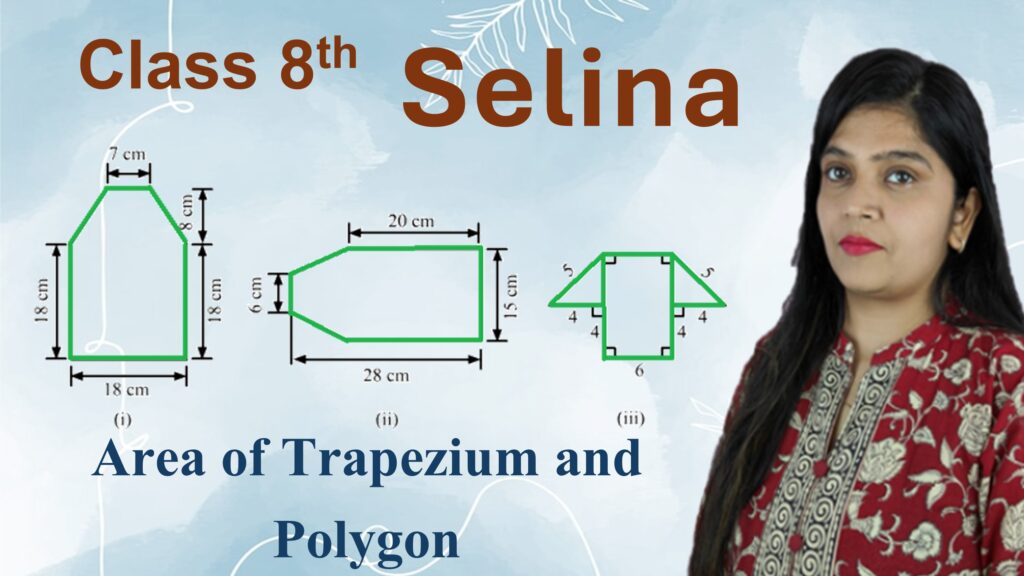Exercise: 3-A
Q1: Multiple Choice Type
i. The square of -8 is:
Step 1:
Square of a negative number: (-8) × (-8) = 64
Answer: d. 64
ii. \(-\sqrt{18 – \sqrt{11 – 7}}\) is equal to:
Step 1:
Simplify inside the inner root: √(11 − 7) = √4 = 2
Step 2:
Now expression becomes: −√(18 − 2) = −√16
Step 3:
√16 = 4 ⇒ −√16 = −4
Answer: b. -4
iii. Square root of \(2.50 × 10^3\) is:
Step 1:
2.50 × 10³ = 2500
Step 2:
√2500 = 50
Answer: c. 50
iv. The smallest natural number which on multiplying with 48 gives a perfect square number is:
Step 1:
Prime factorisation of 48: 2⁴ × 3
Step 2:
To make it a perfect square, all powers must be even. Here, 3 is raised to 1 (odd), so we multiply by another 3.
Answer: b. 3
v. The smallest natural number by which should 175 be divided to get a perfect square number is:
Step 1:
Prime factorisation of 175 = 5² × 7
Step 2:
To make a perfect square, divide out the unpaired prime. Here, 7 is extra, so divide by 7.
Answer: b. 7
Q2: Find the square of:
i. 59
Step 1:
We use the identity:
(a + b)² = a² + 2ab + b²
Here, 59 = 60 − 1
So,
(59)² = (60 − 1)²
= 60² − 2 × 60 × 1 + 1²
Step 2:
= 3600 − 120 + 1 = 3481
Answer: 3481
ii. 6.3
Step 1:
(6.3)² = 6.3 × 6.3
Step 2:
6.3 × 6.3 = 39.69
Answer: 39.69
iii. \(15\frac{2}{3}\)
Step 1:
Convert mixed fraction to improper fraction:
15⅔ = 47⁄3
Step 2:
Square it:
(47⁄3)² = 47² ⁄ 3² = 2209 ⁄ 9
Answer: \(\frac{2209}{9}\)
Q3: By splitting into prime factor, find the square root of:
i. 11025
Step 1:
Perform prime factorisation of 11025:
11025 ÷ 3 = 3675
3675 ÷ 3 = 1225
1225 ÷ 5 = 245
245 ÷ 5 = 49
49 ÷ 7 = 7
7 ÷ 7 = 1
So,
11025 = 3 × 3 × 5 × 5 × 7 × 7
= 3² × 5² × 7²
Step 2:
√11025 = √(3² × 5² × 7²)
= 3 × 5 × 7 = 105
Answer: 105
ii. 396900
Step 1:
Prime factorisation of 396900:
396900 ÷ 2 = 198450
÷2 = 99225
÷3 = 33075
÷3 = 11025
(from previous part, we know 11025 = 3² × 5² × 7²)
So full factorisation:
396900 = 2² × 3⁴ × 5² × 7²
Step 2:
Take square root:
√396900 = √(2² × 3⁴ × 5² × 7²)
= 2 × 3² × 5 × 7 = 2 × 9 × 5 × 7
= 630
Answer: 630
iii. 194481
Step 1:
Let’s do prime factorisation of 194481
194481 ÷ 3 = 64827
÷ 3 = 21609
÷ 3 = 7203
÷ 3 = 2401
Now factor 2401:
2401 ÷ 7 = 343
÷ 7 = 49
÷ 7 = 7
÷ 7 = 1
So,
194481 = 3⁴ × 7⁴
Step 2:
√194481 = √(3⁴ × 7⁴) = 3² × 7² = 9 × 49 = 441
Answer: 441
Q4:
i. Find the smallest number by which 2592 be multiplied so that the product is a perfect square.
Step 1:
Prime factorisation of 2592:
2592 ÷ 2 = 1296
÷ 2 = 648
÷ 2 = 324
÷ 2 = 162
÷ 2 = 81
÷ 3 = 27
÷ 3 = 9
÷ 3 = 3
÷ 3 = 1
So,
2592 = 2⁵ × 3⁴
Step 2:
To make a perfect square, all powers should be even.
2⁵ is odd → multiply by 2 to make it 2⁶.
Answer: 2 (smallest number to multiply to make 2592 a perfect square)
ii. Find the smallest number by which 12748 be multiplied so that the product is a perfect square.
Step 1:
Prime factorisation of 12748:
12748 ÷ 2 = 6374
÷ 2 = 3187 (prime number)
So,
12748 = 2² × 3187
Step 2:
To make it a perfect square:
2² is even
3187 is prime (power 1, odd) ❌
We need one more 3187 to make power even.
Answer: 3187 (smallest number to multiply to make 12748 a perfect square)
Q5: Find the smallest number by which 10368 be divided so that the result is a perfect square. Also. find the square root of the resulting number.
Step 1:
Prime factorisation of 10368:
10368 ÷ 2 = 5184
÷ 2 = 2592
÷ 2 = 1296
÷ 2 = 648
÷ 2 = 324
÷ 2 = 162
÷ 2 = 81
÷ 3 = 27
÷ 3 = 9
÷ 3 = 3
÷ 3 = 1
So,
10368 = 2⁷ × 3⁴
Step 2:
To be a perfect square, all prime exponents must be even.
2⁷ has an odd power → Remove one 2 to make it 2⁶ (even)
So, divide by 2 to get a perfect square.
Step 3:
Perfect square number = 10368 ÷ 2 = 5184
Now,
5184 = 2⁶ × 3⁴ ⇒ All powers are even ⇒ It’s a perfect square
Step 4:
√5184 = √(2⁶ × 3⁴)
= 2³ × 3² = 8 × 9 = 72
Answer: Divide by 2 to get perfect square.
Perfect square = 5184
Square root = 72
Q6: Find the square root of:
i. 0.1764
Step 1:
Write 0.1764 as a fraction:
0.1764 = \(\frac{1764}{10000}\)
Step 2:
Find prime factorisation of numerator 1764:
1764 ÷ 2 = 882
882 ÷ 2 = 441
441 ÷ 3 = 147
147 ÷ 3 = 49
49 ÷ 7 = 7
7 ÷ 7 = 1
So, 1764 = \(2^2 \times 3^2 \times 7^2\)
Denominator 10000 = \(10^4 = (2 \times 5)^4 = 2^4 \times 5^4\)
Step 3:
Now,
\[
\sqrt{0.1764} = \sqrt{\frac{1764}{10000}} = \frac{\sqrt{1764}}{\sqrt{10000}} = \frac{2 \times 3 \times 7}{10^2} = \frac{42}{100} = 0.42
\]Answer: 0.42
ii. \(96\frac{1}{25}\)
Step 1:
Convert mixed fraction to improper fraction:
\[
96\frac{1}{25} = \frac{(96 \times 25) + 1}{25} = \frac{2400 + 1}{25} = \frac{2401}{25}
\]Step 2:
Prime factorisation of numerator 2401:
2401 = \(7^4\) (since \(7 \times 7 \times 7 \times 7 = 2401\))
Denominator 25 = \(5^2\)
Step 3:
Calculate square root:
\[
\sqrt{96\frac{1}{25}} = \sqrt{\frac{2401}{25}} = \frac{\sqrt{2401}}{\sqrt{25}} = \frac{7^2}{5} = \frac{49}{5} = 9.8
\]Answer: 9.8
iii. 0.0169
Step 1:
Write as fraction:
0.0169 = \(\frac{169}{10000}\)
Step 2:
Prime factorisation of numerator 169:
169 = \(13^2\)
Denominator 10000 = \(10^4 = (2 \times 5)^4 = 2^4 \times 5^4\)
Step 3:
Calculate square root:
\[
\sqrt{0.0169} = \sqrt{\frac{169}{10000}} = \frac{\sqrt{169}}{\sqrt{10000}} = \frac{13}{100} = 0.13
\]Answer: 0.13
Q7: Evaluate:
i. \(\sqrt{\frac{14.4}{22.5}}\)
Step 1:
Convert decimals to fractions:
\[
14.4 = \frac{144}{10}, \quad 22.5 = \frac{225}{10}
\]Step 2:
Calculate the fraction:
\[
\frac{14.4}{22.5} = \frac{\frac{144}{10}}{\frac{225}{10}} = \frac{144}{10} \times \frac{10}{225} = \frac{144}{225}
\]Step 3:
Simplify \(\frac{144}{225}\):
Both divisible by 9:
\[
\frac{144 \div 9}{225 \div 9} = \frac{16}{25}
\]Step 4:
Find square root:
\[
\sqrt{\frac{16}{25}} = \frac{\sqrt{16}}{\sqrt{25}} = \frac{4}{5} = 0.8
\]Answer: 0.8
ii. \(\sqrt{\frac{0.225}{28.9}}\)
Step 1:
Convert decimals to fractions:
\[
0.225 = \frac{225}{1000} = \frac{9}{40} \quad \text{(dividing numerator and denominator by 25)}
\]
\[
28.9 = \frac{289}{10}
\]Step 2:
Calculate the fraction:
\[
\frac{0.225}{28.9} = \frac{\frac{9}{40}}{\frac{289}{10}} = \frac{9}{40} \times \frac{10}{289} = \frac{9 \times 10}{40 \times 289} = \frac{90}{11560}
\]Step 3:
Simplify \(\frac{90}{11560}\):
Divide numerator and denominator by 10:
\[
\frac{9}{1156}
\]Step 4:
Prime factorization:
9 = \(3^2\)
1156 = \(2^2 \times 17^2\) because:
1156 ÷ 2 = 578, ÷ 2 = 289, and 289 = 17²
Step 5:
Square root:
\[
\sqrt{\frac{9}{1156}} = \frac{\sqrt{9}}{\sqrt{1156}} = \frac{3}{2 \times 17} = \frac{3}{34} \approx 0.0882
\]Answer: \(\frac{3}{34}\) or approximately 0.0882
iii. \(\sqrt{\frac{25}{32} \times 2\frac{13}{18} \times 0.25}\)
Step 1:
Convert mixed and decimal to fractions:
\[
2\frac{13}{18} = \frac{2 \times 18 + 13}{18} = \frac{49}{18}
\]
\[
0.25 = \frac{1}{4}
\]Step 2:
Multiply the fractions:
\[
\frac{25}{32} \times \frac{49}{18} \times \frac{1}{4} = \frac{25 \times 49 \times 1}{32 \times 18 \times 4} = \frac{1225}{2304}
\]Step 3:
Prime factorization:
1225 = \(35^2 = (5 \times 7)^2 = 5^2 \times 7^2\)
2304 = \(48^2 = (2^4 \times 3)^2 = 2^8 \times 3^2\)
Step 4:
Square root:
\[
\sqrt{\frac{1225}{2304}} = \frac{\sqrt{1225}}{\sqrt{2304}} = \frac{35}{48} \approx 0.7292
\]Answer: \(\frac{35}{48}\) or approximately 0.7292
iv. \(\sqrt{1\frac{4}{5} \times 14\frac{21}{44} \times 2\frac{7}{55}}\)
Step 1:Convert mixed numbers to improper fractions:
\[
1\frac{4}{5} = \frac{9}{5}
\]
\[
14\frac{21}{44} = \frac{14 \times 44 + 21}{44} = \frac{616 + 21}{44} = \frac{637}{44}
\]
\[
2\frac{7}{55} = \frac{2 \times 55 + 7}{55} = \frac{110 + 7}{55} = \frac{117}{55}
\]Step 2:Multiply all fractions:
\[
\frac{9}{5} \times \frac{637}{44} \times \frac{117}{55} = \frac{9 \times 637 \times 117}{5 \times 44 \times 55}
\]Step 3:Calculate prime factors of numerator and denominator:
Numerator:
9 = 3 × 3
637 = 7 × 7 × 13
117 = 3 × 13 × 3
9 × 637 × 117 = \(3^4 \times 7^2 \times 13^2\)
Denominator:
5 = 5 × 1
44 = 2 × 2 × 11
55 = 5 × 11
5 × 44 × 55 = \(2^2 \times 5^2 \times 11^2\)
So, fraction = \(\frac{3^4 \times 7^2 \times 13^2}{2^2 \times 5^2 \times 11^2}\)
Step 4:Calculate approximate decimal value:
\[
\sqrt{\frac{3^4 \times 7^2 \times 13^2}{2^2 \times 5^2 \times 11^2}} = \frac{3^2 \times 7^1 \times 13^1}{2^1 \times 5^1 \times 11^1}
\]
\[
= \frac{546}{110}
\]Answer: \(\frac{546}{110}\)
Q8: Evaluate:
i. \(\sqrt{3^2 \times 6^3 \times 24}\)
Step 1:
Prime factorize the terms:
\[
3^2 = 3^2
\]
\[
6^3 = (2 \times 3)^3 = 2^3 \times 3^3
\]
\[
24 = 2^3 \times 3
\]Step 2:
Multiply all prime factors:
\[
3^2 \times 2^3 \times 3^3 \times 2^3 \times 3 = 2^{3+3} \times 3^{2+3+1} = 2^6 \times 3^6
\]Step 3:
Apply square root:
\[
\sqrt{2^6 \times 3^6} = 2^{6/2} \times 3^{6/2} = 2^3 \times 3^3 = 8 \times 27 = 216
\]Answer: 216
ii. \(\sqrt{(0.5)^3 \times 6 \times 3^5}\)
Step 1:
Convert decimal to fraction:
\[
0.5 = \frac{1}{2}
\]Step 2:
Rewrite expression:
\[
\sqrt{\left(\frac{1}{2}\right)^3 \times 6 \times 3^5} = \sqrt{\frac{1}{8} \times 6 \times 3^5}
\]Step 3:
Prime factorize:
\[
6 = 2 \times 3
\]
\[
3^5 = 3^5
\]Step 4:
Calculate inside root:
\[
\frac{1}{8} \times 6 \times 3^5 = \frac{1}{2^3} \times 2 \times 3 \times 3^5 = \frac{2 \times 3^{6}}{2^3} = 3^6 \times \frac{2}{8} = 3^6 \times \frac{1}{4}
\]Step 5:
Simplify inside root:
\[
3^6 \times \frac{1}{4} = \frac{3^6}{2^2}
\]Step 6:
Square root:
\[
\sqrt{\frac{3^6}{2^2}} = \frac{3^{6/2}}{2^{2/2}} = \frac{3^3}{2} = \frac{27}{2} = 13.5
\]Answer: \(\frac{27}{2}\) or 13.5
iii. \(\sqrt{\left(5 + 2\frac{21}{25}\right) \times \frac{0.169}{1.6}}\)
Step 1:
Convert mixed number to improper fraction:
\[
2\frac{21}{25} = \frac{2 \times 25 + 21}{25} = \frac{71}{25}
\]
\[
5 = \frac{125}{25}
\]
\[
5 + 2\frac{21}{25} = \frac{125}{25} + \frac{71}{25} = \frac{196}{25}
\]Step 2:
Convert decimals to fractions:
\[
0.169 = \frac{169}{1000}
\]
\[
1.6 = \frac{16}{10} = \frac{8}{5}
\]
\[
\frac{0.169}{1.6} = \frac{\frac{169}{1000}}{\frac{8}{5}} = \frac{169}{1000} \times \frac{5}{8} = \frac{169 \times 5}{1000 \times 8} = \frac{845}{8000}
\]Step 3:Calculate prime factors of numerator and denominator:
Numerator:
196 = 2 × 2 × 7 × 7
845 = 5 × 13 × 13
196 × 845 = \(2^2 \times 7^2 \times 5^1 \times 13^2\)
Denominator:
25 = 5 × 5
8000 = 2 × 2 × 2 × 2 × 2 × 2 × 5 × 5 × 5
25 × 8000 = \(2^6 \times 5^5\)
So, fraction = \(\frac{2^2 \times 7^2 \times 5^1 \times 13^2}{2^6 \times 5^5}\)
Step 4:Square root:
\[
\sqrt{\frac{2^2 \times 7^2 \times 5^1 \times 13^2}{2^6 \times 5^5}} = \sqrt{2^{2-6} \times 7^2 \times 5^{1-5} \times 13^2}
\]
\[
= \sqrt{2^{-4} \times 7^2 \times 5^{-4} \times 13^2} = \sqrt{\frac{(7^2) \times 13^2}{2^4 \times 5^4}} = \frac{7 \times 13}{2^2 \times 5^2} = \frac{91}{100} = 0.91
\]
Answer: 0.91
iv. \(\sqrt{5\left(2\frac{3}{4} – \frac{3}{10}\right)}\)
Step 1:
Convert mixed number to improper fraction:
\[
2\frac{3}{4} = \frac{2 \times 4 + 3}{4} = \frac{11}{4}
\]Step 2:
Subtract:
\[
\frac{11}{4} – \frac{3}{10} = \frac{11 \times 10 – 3 \times 4}{4 \times 10} = \frac{110 – 12}{40} = \frac{98}{40} = \frac{49}{20}
\]Step 3:
Multiply by 5:
\[
5 \times \frac{49}{20} = \frac{245}{20} = \frac{49}{4}
\]Step 4:
Square root:
\[
\sqrt{\frac{49}{4}} = \frac{\sqrt{49}}{\sqrt{4}} = \frac{7}{2} = 3.5
\]Answer: \(\frac{7}{2}\) or 3.5
v. \(\sqrt{248 + \sqrt{52 + \sqrt{144}}}\)
Step 1:
Calculate innermost root:
\[
\sqrt{144} = 12
\]Step 2:
Calculate next root:
\[
\sqrt{52 + 12} = \sqrt{64} = 8
\]Step 3:
Calculate outer root:
\[
\sqrt{248 + 8} = \sqrt{256} = 16
\]Answer: 16
Q9: A man. after a tour, finds that he had spent every day as many rupees as the number of days he had been on tour. How long did this tour last, if he spent in all ₹ 1,296?
Let the number of days he was on tour be x
Step 1:
According to the question, he spends ₹x each day for x days. That means total expenditure is:
\[
\text{Total spent} = x \times x = x^2
\]Step 2:
It is given that the total amount spent is ₹1,296. So we equate:
\[
x^2 = 1296
\]Step 3:
Take square root on both sides:
\[
x = \sqrt{1296}
\]Step 4:
Find the square root by prime factorization:
1296 = 2⁴ × 3⁴
\[
\sqrt{1296} = \sqrt{2^4 \times 3^4} = 2^2 \times 3^2 = 4 \times 9 = 36
\]Answer: The tour lasted for 36 days.
Q10: Out of 745 students. maximum are to be arranged in the school field for a P.T. display, such that the number of rows is equal to the number of columns. Find the number of rows if 16 students were left out after the arrangement.
Let the number of rows = number of columns = x
Step 1:
Since the arrangement is in a square form:
\[
\text{Total students in square formation} = x \times x = x^2
\]Step 2:
Given: 16 students are left out, so:
\[
x^2 + 16 = 745
\]Step 3:
Subtract 16 from both sides:
\[
x^2 = 745 – 16 = 729
\]Step 4:
Take square root of both sides:
\[
x = \sqrt{729}
\]
Now factor 729:
\[
729 = 3^6
\Rightarrow \sqrt{729} = 3^3 = 27
\]Answer: Number of rows = 27
Q11: 13 and 31 is a strange pair of numbers such that their squares 169 and 961 are also mirror images of each other. Find two more such pairs.
We are to find two more such pairs where:
Both numbers are mirror images of each other (like 13 and 31)
Their squares are also mirror images (like 169 and 961)
Step 1:
Try 12 and 21
\[
12^2 = 144,\quad 21^2 = 441
\]
→ 144 and 441 are mirror images
Step 2:
Try 102 and 201
\[
102^2 = 10404,\quad 201^2 = 40401
\]
→ 10404 and 40401 are mirror images
Answer: The two more such mirror image pairs are:
1) 12 and 21 → 144 and 441
2) 102 and 201 → 10404 and 40401
Q12: Find the smallest perfect square divisible by 3, 4, 5 and 6.
We will use the LCM (Least Common Multiple) method.
Step 1:
Find the LCM of 3, 4, 5 and 6.
Prime factorizations:
\(3 = 3\)
\(4 = 2^2\)
\(5 = 5\)
\(6 = 2 × 3\)
LCM = Highest powers of all primes involved:
\[
LCM = 2^2 × 3 × 5 = 4 × 3 × 5 = 60
\]Step 2:
LCM = 60 is divisible by 3, 4, 5 and 6 but is not a perfect square.
Let’s make it a perfect square by multiplying the missing factors:
Prime factorization of 60:
\[
60 = 2^2 × 3 × 5
\]
To make it a perfect square, all exponents should be even.
Currently:
2 has power 2 → already even
3 has power 1 → needs one more 3
5 has power 1 → needs one more 5
So multiply by 3 × 5 = 15
\[
\text{Smallest perfect square} = 60 × 15 = 900
\]Step 3:
Verify:
\[
\sqrt{900} = 30
\]
And 900 is divisible by 3, 4, 5, and 6
Answer: The smallest perfect square divisible by 3, 4, 5 and 6 is 900.
Q13: If \(\sqrt{784}=28\), find the value of:
i. \(\sqrt{7.84} + \sqrt{78400}\)
Step 1:
We know:
\[
784 = 28^2 \Rightarrow \sqrt{784} = 28
\]Now,
\[
7.84 = \frac{784}{100} \Rightarrow \sqrt{7.84} = \sqrt{\frac{784}{100}} = \frac{\sqrt{784}}{\sqrt{100}} = \frac{28}{10} = 2.8
\]And
\[
78400 = 784 \times 100 \Rightarrow \sqrt{78400} = \sqrt{784 \times 100} = \sqrt{784} \times \sqrt{100} = 28 \times 10 = 280
\]Step 2:
Now add:
\[
\sqrt{7.84} + \sqrt{78400} = 2.8 + 280 = 282.8
\]Answer: 282.8
ii. \(\sqrt{0.0784} + \sqrt{0.000784}\)
Step 1:
\[
0.0784 = \frac{784}{10000} \Rightarrow \sqrt{0.0784} = \sqrt{\frac{784}{10000}} = \frac{\sqrt{784}}{\sqrt{10000}} = \frac{28}{100} = 0.28
\]And
\[
0.000784 = \frac{784}{1000000} \Rightarrow \sqrt{0.000784} = \sqrt{\frac{784}{1000000}} = \frac{\sqrt{784}}{\sqrt{1000000}} = \frac{28}{1000} = 0.028
\]Step 2:
Now add:
\[
\sqrt{0.0784} + \sqrt{0.000784} = 0.28 + 0.028 = 0.308
\]Answer: 0.308






Leave a Comment